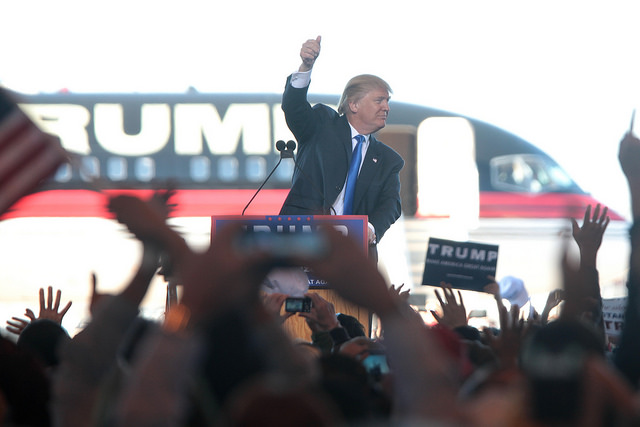A Look at the World of Presidential Playlists

Trump at a campaign rally
Thousands of screaming fans, blaring music, and dazzling lights; am I describing a rock concert or a Donald Trump rally? The line between the two is getting more and more blurred, and that’s kind of the point. From DJ sets at rallies to commercials and even Spotify playlists, music is an increasingly integral part of any presidential campaign. As Dana Gorzelany-Mostak puts it, “Candidates use music to constitute their identity in sound, to sonically construct themselves in ways that appeal to the public, as well as to offer insight into their character and into their beliefs.”
Gorzelany-Mostak founded Trax on the Trail, a website dedicated to the study of the use of music in presidential campaigns, with a specific emphasis on our current 2016 election. However, Gorzelany-Mostak points out that presidential campaigns have used music for quite a while. For example, “Tippecanoe and Tyler Too”, set to the tune of an old minstrel song, was an early use of music in the 1840 presidential race between William Henry Harrison and Martin Van Buren, and Frank Sinatra famously allowed his song “High Hopes” to be used as part of John F. Kennedy’s 1960 campaign.
But today, presidential candidates are elevated to near-celebrity status, and campaigns have changed to market the personalities of these candidates as much as their messages. For many, music can be one tool used to showcase these candidates and expound upon their political platforms. Take Donald Trump, for example. Since day one, Trump’s platform has revolved around forging his own political path and rejecting Washington’s status quo, and often times, the music he chooses doesn’t stray too far from his ideas. Trump has used controversial hits like The Rolling Stones’ “Sympathy for the Devil,” and has recently stirred controversy over continuing to use Adele’s “Rolling in the Deep” after the British singer asked him to not use the song.
“In using music with objectionable lyrics, he’s asserting his belief that…he should not have to play by the rules,” Gorzelany-Mostak says.
On the other side of the aisle, the Bernie Sanders campaign has taken a markedly broad approach to music choice, choosing to focus on the big picture rather than the calculated significance of specific songs. The Sanders campaign has used everything from folk hero Woodie Guthrie’s classic “This Land Is Your Land” to the rap super group Run the Jewels’ fiery track “Close Your Eyes (And Count to F**k)”.
“He’s making a point about the universality of his message. And the appeal of his message transcends class, and race, and gender identity but…also music genre as well,” Gorzelany-Mostak says.
For some candidates, music is simply something used to help them stand out from a crowded field of contenders. For example, former candidate Marco Rubio made headlines for proclaiming his love of electronic dance music, or EDM, and using these dance tracks in his rallies. Rubio is believed to be the first presidential candidate to use EDM in a campaign. And former Democratic candidate Martin O’Malley wasn’t afraid to bring his own guitar out on stage, even going as far as performing a cover of Taylor Swift’s “Bad Blood” on ABC’s The View.
John Balduzzi, founder of the Democratic campaign consulting firm Balduzzi Group and Trax on the Trail contributor, says, “When the words all sound the same, and there’s 15 candidates running and they’re all talking about the same issue, it’s the music in the background that really gets people kind of revved up.”
However, the use of music in campaigns doesn’t always go quite as planned. In some cases, a candidate’s use of music can lead to some hidden snickering and light jokes at best, to heated controversy at worst; just ask former candidate Ben Carson. Carson’s campaign released a Carson-centric rap track called “Freedom” that was meant to target young black voters. However, the song backfired horribly, with pundits pointing out comments Carson made in April 2015 about how hip-hop was destroying black communities.
In this crazy election cycle, candidates are focused on how to best represent themselves to the public at large, and music can be an avenue for candidates to do this. As Balduzzi says, “It would just be odd if Donald Trump came out [at a rally] to Beethoven, right? It just doesn’t work, it just doesn’t fit.” But in trying to solve this problem of how to put their best foot forward, the answer for presidential candidates might be as simple as pressing play.

